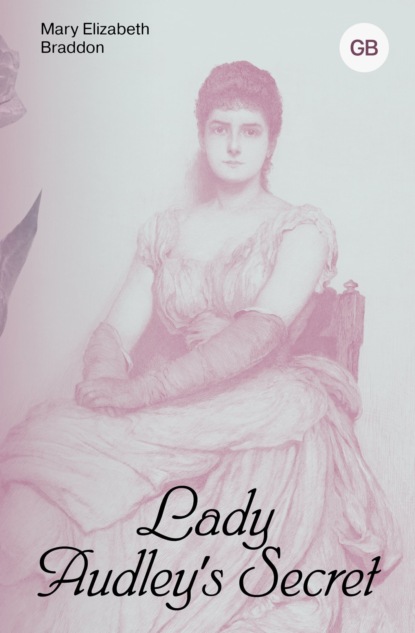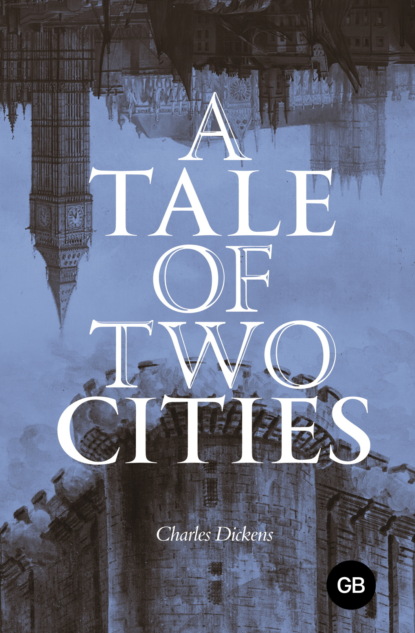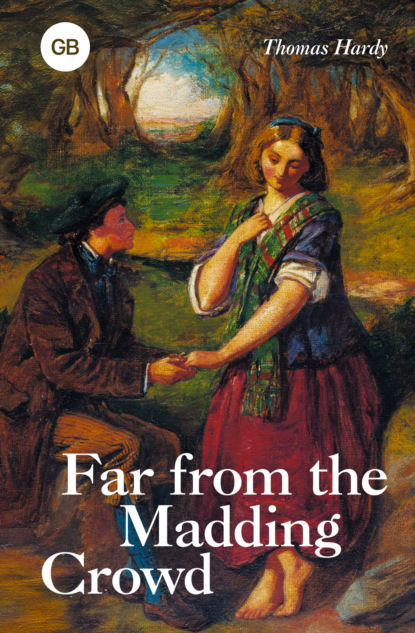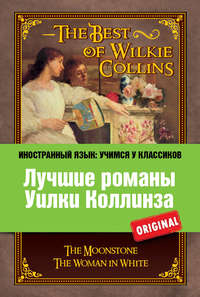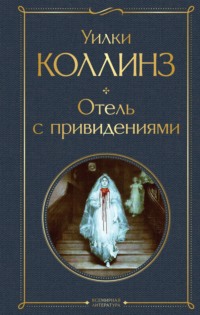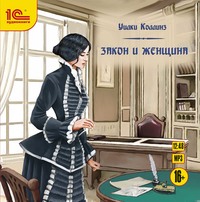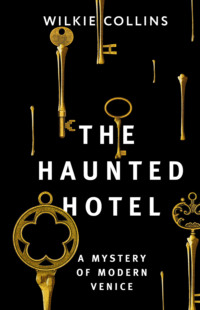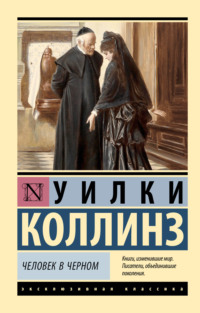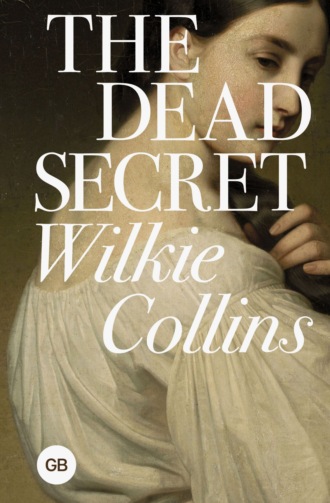
Полная версия
The Dead Secret / Тайна
She placed the keys on a writing-table near her, took up a pen, and rapidly added these lines on the blank side of the letter which she had written under her mistress's dictation —
“If this paper should ever be found (which I pray with my whole heart it never may be), I wish to say that I have come to the resolution of hiding it, because I dare not show the writing that it contains to my master, to whom it is addressed. In doing what I now propose to do, though I am acting against my mistress's last wishes, I am not breaking the solemn engagement which she obliged me to make before her on her death-bed. That engagement forbids me to destroy this letter, or to take it away with me if I leave the house. I shall do neither – my purpose is to conceal it in the place, of all others, where I think there is least chance of its ever being found again. Any hardship or misfortune which may follow as a consequence of this deceitful proceeding on my part, will fall on myself. Others, I believe in my conscience, will be the happier for the hiding of the dreadful Secret which this letter contains.”
She signed those lines with her name – pressed them hurriedly over the blotting-pad that lay with the rest of the writing materials on the table – took the note in her hand, after first folding it up – and then, snatching at the bunch of keys, with a look all round her as if she dreaded being secretly observed, left the room. All her actions since she had entered it had been hasty and sudden; she was evidently afraid of allowing herself one leisure moment to reflect.
On quitting the housekeeper's room, she turned to the left, ascended a back staircase, and unlocked a door at the top of it. A cloud of dust flew all about her as she softly opened the door; a mouldy coolness made her shiver as she crossed a large stone hall, with some black old family portraits hanging on the walls, the canvases of which were bulging out of the frames. Ascending more stairs, she came upon a row of doors, all leading into rooms on the first floor of the north side of the house.
She knelt down, putting the letter on the boards beside her, opposite the key-hole of the fourth door she came to after reaching the top of the stairs, peered in distrustfully for an instant, then began to try the different keys till she found one that fitted the lock. She had great difficulty in accomplishing this, from the violence of her agitation, which made her hands tremble to such a degree that she was hardly able to keep the keys separate one from the other. At length she succeeded in opening the door. Thicker clouds of dust than she had yet met with flew out the moment the interior of the room was visible; a dry, airless, suffocating atmosphere almost choked her as she stooped to pick up the letter from the floor. She recoiled from it at first, and took a few steps back toward the staircase. But she recovered her resolution immediately.
“I can't go back now!” she said, desperately, and entered the room.
She did not remain in it more than two or three minutes. When she came out again her face was white with fear, and the hand which had held the letter when she went into the room held nothing now but a small rusty key.
After locking the door again, she examined the large bunch of keys which she had taken from the housekeeper's room, with closer attention than she had yet bestowed on them. Besides the ivory label attached to the ring that connected them, there were smaller labels, of parchment, tied to the handles of some of the keys, to indicate the rooms to which they gave admission. The particular key which she had used had one of these labels hanging to it. She held the little strip of parchment close to the light, and read on it, in written characters faded by time —
“The Myrtle Room.”
The room in which the letter was hidden had a name, then! A prettily sounding name that would attract most people, and keep pleasantly in their memories. A name to be distrusted by her, after what she had done, on that very account.
She took her housewife from its usual place in the pocket of her apron, and, with the scissors which it contained, cut the label from the key. Was it enough to destroy that one only? She lost herself in a maze of useless conjecture; and ended by cutting off the other labels, from no other motive than instinctive suspicion of them.
Carefully gathering up the strips of parchment from the floor, she put them, along with the little rusty key which she had brought out of the Myrtle Room, in the empty pocket of her apron. Then, carrying the large bunch of keys in her hand, and carefully locking the doors that she had opened on her way to the north side of Porthgenna Tower, she retraced her steps to the housekeeper's room, entered it without seeing any body, and hung up the bunch of keys again on the nail in the wall.
Fearful, as the morning hours wore on, of meeting with some of the female servants, she next hastened back to her bedroom. The candle she had left there was still burning feebly in the fresh daylight. When she drew aside the window-curtain, after extinguishing the candle, a shadow of her former fear passed over her face, even in the broad daylight that now flowed in upon it. She opened the window, and leaned out eagerly into the cool air.
Whether for good or for evil, the fatal Secret was hidden now – the act was done. There was something calming in the first consciousness of that one fact. She could think more composedly, after that, of herself, and of the uncertain future that lay before her.
Under no circumstances could she have expected to remain in her situation, now that the connection between herself and her mistress had been severed by death. She knew that Mrs. Treverton, in the last days of her illness, had earnestly recommended her maid to Captain Treverton's kindness and protection, and she felt assured that the wife's last entreaties, in this as in all other instances, would be viewed as the most sacred of obligations by the husband. But could she accept protection and kindness at the hand of the master whom she had been accessory to deceiving, and whom she had now committed herself to deceiving still? The bare idea of such baseness was so revolting, that she accepted, almost with a sense of relief, the one sad alternative that remained – the alternative of leaving the house immediately.
And how was she to leave it? By giving formal warning, and so exposing herself to questions which would be sure to confuse and terrify her? Could she venture to face her master again, after what she had done – to face him, when his first inquiries would refer to her mistress, when he would be certain to ask her for the last mournful details, for the slightest word that had been spoken during the death-scene that she alone had witnessed? She started to her feet, as the certain consequences of submitting herself to that unendurable trial all crowded together warningly on her mind, took her cloak from its place on the wall, and listened at her door in sudden suspicion and fear. Had she heard footsteps? Was her master sending for her already?
No; all was silent outside. A few tears rolled over her cheeks as she put on her bonnet, and felt that she was facing, by the performance of that simple action, the last, and perhaps the hardest to meet, of the cruel necessities in which the hiding of the Secret had involved her. There was no help for it. She must run the risk of betraying every thing, or brave the double trial of leaving Porthgenna Tower, and leaving it secretly.
Secretly – as a thief might go? Without a word to her master? without so much as one line of writing to thank him for his kindness and to ask his pardon? She had unlocked her desk, and had taken from it her purse, one or two letters, and a little book of Wesley's Hymns, before these considerations occurred to her. They made her pause in the act of shutting up the desk. “Shall I write?” she asked herself, “and leave the letter here, to be found when I am gone?”
A little more reflection decided her in the affirmative. As rapidly as her pen could form the letters, she wrote a few lines addressed to Captain Treverton, in which she confessed to having kept a secret from his knowledge which had been left in her charge to divulge; adding, that she honestly believed no harm could come to him, or to any one in whom he was interested, by her failing to perform the duty intrusted to her; and ended by asking his pardon for leaving the house secretly, and by begging, as a last favor, that no search might ever be made for her. Having sealed this short note, and left it on her table, with her master's name written outside, she listened again at the door; and, after satisfying herself that no one was yet stirring, began to descend the stairs at Porthgenna Tower for the last time.
At the entrance of the passage leading to the nursery she stopped. The tears which she had restrained since leaving her room began to flow again. Urgent as her reasons now were for effecting her departure without a moment's loss of time, she advanced, with the strangest inconsistency, a few steps toward the nursery door. Before she had gone far, a slight noise in the lower part of the house caught her ear and instantly checked her further progress.
While she stood doubtful, the grief at her heart – a greater grief than any she had yet betrayed – rose irresistibly to her lips, and burst from them in one deep gasping sob. The sound of it seemed to terrify her into a sense of the danger of her position, if she delayed a moment longer. She ran out again to the stairs, reached the kitchen-floor in safety, and made her escape by the garden door which the servant had opened for her at the dawn of the morning.
On getting clear of the premises at Porthgenna Tower, instead of taking the nearest path over the moor that led to the high-road, she diverged to the church; but stopped before she came to it, at the public well of the neighborhood, which had been sunk near the cottages of the Porthgenna fishermen. Cautiously looking round her, she dropped into the well the little rusty key which she had brought out of the Myrtle Room; then hurried on, and entered the church-yard. She directed her course straight to one of the graves, situated a little apart from the rest. On the head-stone were inscribed these words:
SACRED TO THE MEMORY
OF
Hugh Polwheal,
AGED 26 YEARS.
HE MET WITH HIS DEATH
THROUGH THE FALL OF A ROCK
IN
PORTHGENNA MINE,
DECEMBER 17TH, 1823.
Gathering a few leaves of grass from the grave, Sarah opened the little book of Wesley's Hymns which she had brought with her from the bedroom of Porthgenna Tower, and placed the leaves delicately and carefully between the pages. As she did this, the wind blew open the title-page of the Hymns, and displayed this inscription on it, written in large, clumsy characters —”Sarah Leeson, her book. The gift of Hugh Polwheal.”
Having secured the blades of grass between the pages of the book, she retraced her way toward the path leading to the high-road. Arrived on the moor, she took out of her apron pocket the parchment labels that had been cut from the keys, and scattered them under the furze-bushes.
“Gone,” she said, “as I am gone! God help and forgive me – it is all done and over now!”
With those words she turned her back on the old house and the sea-view below it, and followed the moorland path on her way to the high-road.
Four hours afterward Captain Treverton desired one of the servants at Porthgenna Tower to inform Sarah Leeson that he wished to hear all she had to tell him of the dying moments of her mistress. The messenger returned with looks and words of amazement, and with the letter that Sarah had addressed to her master in his hand.
The moment Captain Treverton had read the letter, he ordered an immediate search to be made after the missing woman. She was so easy to describe and to recognize, by the premature grayness of her hair, by the odd, scared look in her eyes, and by her habit of constantly talking to herself, that she was traced with certainty as far as Truro. In that large town the track of her was lost, and never recovered again.
Rewards were offered; the magistrates of the district were interested in the case; all that wealth and power could do to discover her was done – and done in vain. No clew was found to suggest a suspicion of her whereabouts, or to help in the slightest degree toward explaining the nature of the secret at which she had hinted in her letter. Her master never saw her again, never heard of her again, after the morning of the twenty-third of August, eighteen hundred and twenty-nine.
Book II
Chapter I
Fifteen Years After
The church of Long Beckley (a large agricultural village in one of the midland counties of England), although a building in no way remarkable either for its size, its architecture, or its antiquity, possesses, nevertheless, one advantage which mercantile London has barbarously denied to the noble cathedral church of St. Paul. It has plenty of room to stand in, and it can consequently be seen with perfect convenience from every point of view, all around the compass.
The large open space around the church can be approached in three different directions. There is a road from the village, leading straight to the principal door. There is a broad gravel walk, which begins at the vicarage gates, crosses the church-yard, and stops, as in duty bound, at the vestry entrance. There is a footpath over the fields, by which the lord of the manor, and the gentry in general who live in his august neighborhood, can reach the side door of the building, whenever their natural humility may incline them to encourage Sabbath observance in the stables by going to church, like the lower sort of worshipers, on their own legs.
At half-past seven o'clock, on a certain fine summer morning, in the year eighteen hundred and forty-four, if any observant stranger had happened to be standing in some unnoticed corner of the church-yard, and to be looking about him with sharp eyes, he would probably have been the witness of proceedings which might have led him to believe that there was a conspiracy going on in Long Beckley, of which the church was the rallying-point, and some of the most respectable inhabitants the principal leaders. Supposing him to have been looking toward the vicarage as the clock chimed the half-hour, he would have seen the vicar of Long Beckley, the Reverend Doctor Chennery, leaving his house suspiciously, by the back way, glancing behind him guiltily as he approached the gravel walk that led to the vestry, stopping mysteriously just outside the door, and gazing anxiously down the road that led from the village.
Assuming that our observant stranger would, upon this, keep out of sight, and look down the road, like the vicar, he would next have seen the clerk of the church – an austere, yellow-faced man – a Protestant Loyola in appearance, and a working shoemaker by trade – approaching with a look of unutterable mystery in his face, and a bunch of big keys in his hands. He would have seen the vicar nod in an abstracted manner to the clerk, and say, “Fine morning, Thomas. Have you had your breakfast yet?” He would have heard Thomas reply, with a suspicious regard for minute particulars: “I have had a cup of tea and a crust, Sir.” And he would then have seen these two local conspirators, after looking up with one accord at the church clock, draw off together to the side door which commanded a view of the footpath across the fields.
Following them – as our inquisitive stranger could not fail to do – he would have detected three more conspirators advancing along the footpath. The leader of this treasonable party was an elderly gentleman, with a weather-beaten face and a bluff, hearty manner. His two followers were a young gentleman and a young lady, walking arm-in-arm, and talking together in whispers. They were dressed in the plainest morning costume. The faces of both were rather pale, and the manner of the lady was a little flurried. Otherwise there was nothing remarkable to observe in them, until they came to the wicket-gate leading into the church-yard; and there the conduct of the young gentleman seemed, at first sight, rather inexplicable. Instead of holding the gate open for the lady to pass through, he hung back, allowed her to open it for herself, waited till she had got to the church-yard side, and then, stretching out his hand over the gate, allowed her to lead him through the entrance, as if he had suddenly changed from a grown man to a helpless little child.
Noting this, and remarking also that, when the party from the fields had arrived within greeting distance of the vicar, and when the clerk had used his bunch of keys to open the church-door, the young lady's companion was led into the building (this time by Doctor Chennery's hand), as he had been previously led through the wicket-gate, our observant stranger must have arrived at one inevitable conclusion – that the person requiring such assistance as this was suffering under the affliction of blindness. Startled a little by that discovery, he would have been still further amazed, if he had looked into the church, by seeing the blind man and the young lady standing together before the altar rails, with the elderly gentleman in parental attendance. Any suspicions he might now entertain that the bond which united the conspirators at that early hour of the morning was of the hymeneal sort, and that the object of their plot was to celebrate a wedding with the strictest secrecy, would have been confirmed in five minutes by the appearance of Doctor Chennery from the vestry in full canonicals, and by the reading of the marriage service in the reverend gentleman's most harmonious officiating tones. The ceremony concluded, the attendant stranger must have been more perplexed than ever by observing that the persons concerned in it all separated, the moment the signing, the kissing, and congratulating duties proper to the occasion had been performed, and quickly retired in the various directions by which they had approached the church.
Leaving the clerk to return by the village road, the bride, bridegroom, and elderly gentleman to turn back by the footpath over the fields, and the visionary stranger of these pages to vanish out of them in any direction that he pleases – let us follow Doctor Chennery to the vicarage breakfast-table, and hear what he has to say about his professional exertions of the morning in the familiar atmosphere of his own family circle.
The persons assembled at the breakfast were, first, Mr. Phippen, a guest; secondly, Miss Sturch, a governess; thirdly, fourthly, and fifthly, Miss Louisa Chennery (aged eleven years), Miss Amelia Chennery (aged nine years), and Master Robert Chennery (aged eight years). There was no mother's face present, to make the household picture complete. Doctor Chennery had been a widower since the birth of his youngest child.
The guest was an old college acquaintance of the vicar's, and he was supposed to be now staying at Long Beckley for the benefit of his health. Most men of any character at all contrive to get a reputation of some sort which individualizes them in the social circle amid which they move. Mr. Phippen was a man of some little character, and he lived with great distinction in the estimation of his friends on the reputation of being A Martyr to Dyspepsia.
Wherever Mr. Phippen went, the woes of Mr. Phippen's stomach went with him. He dieted himself publicly, and physicked himself publicly. He was so intensely occupied with himself and his maladies, that he would let a chance acquaintance into the secret of the condition of his tongue at five minutes' notice; being just as perpetually ready to discuss the state of his digestion as people in general are to discuss the state of the weather. On this favorite subject, as on all others, he spoke with a wheedling gentleness of manner, sometimes in softly mournful, sometimes in languidly sentimental tones. His politeness was of the oppressively affectionate sort, and he used the word “dear” continually in addressing himself to others. Personally, he could not be called a handsome man. His eyes were watery, large, and light gray; they were always rolling from side to side in a state of moist admiration of something or somebody. His nose was long, drooping, profoundly melancholy – if such an expression may be permitted, in reference to that particular feature. For the rest, his lips had a lachrymose twist; his stature was small; his head large, bald, and loosely set on his shoulders; his manner of dressing himself eccentric, on the side of smartness; his age about five-and-forty; his condition that of a single man. Such was Mr. Phippen, the Martyr to Dyspepsia, and the guest of the vicar of Long Beckley.
Miss Sturch, the governess, may be briefly and accurately described as a young lady who had never been troubled with an idea or a sensation since the day when she was born. She was a little, plump, quiet, white-skinned, smiling, neatly dressed girl, wound up accurately to the performance of certain duties at certain times; and possessed of an inexhaustible vocabulary of commonplace talk, which dribbled placidly out of her lips whenever it was called for, always in the same quantity, and always of the same quality, at every hour in the day, and through every change in the seasons. Miss Sturch never laughed, and never cried, but took the safe middle course of smiling perpetually. She smiled when she came down on a morning in January, and said it was very cold. She smiled when she came down on a morning in July, and said it was very hot. She smiled when the bishop came once a year to see the vicar; she smiled when the butcher's boy came every morning for orders. Let what might happen at the vicarage, nothing ever jerked Miss Sturch out of the one smooth groove in which she ran perpetually, always at the same pace. If she had lived in a royalist family, during the civil wars in England, she would have rung for the cook, to order dinner, on the morning of the execution of Charles the First. If Shakspeare had come back to life again, and had called at the vicarage at six o'clock on Saturday evening, to explain to Miss Sturch exactly what his views were in composing the tragedy of Hamlet, she would have smiled and said it was extremely interesting, until the striking of seven o'clock; at which time she would have left him in the middle of a sentence, to superintend the housemaid in the verification of the washing-book. A very estimable young person, Miss Sturch (as the ladies of Long Beckley were accustomed to say); so judicious with the children, and so attached to her household duties; such a well-regulated mind, and such a crisp touch on the piano; just nice-looking enough, just well-dressed enough, just talkative enough; not quite old enough, perhaps, and a little too much inclined to be embraceably plump about the region of the waist – but, on the whole, a most estimable young person – very much so, indeed.
On the characteristic peculiarities of Miss Sturch's pupils, it is not necessary to dwell at very great length. Miss Louisa's habitual weakness was an inveterate tendency to catch cold. Miss Amelia's principal defect was a disposition to gratify her palate by eating supplementary dinners and breakfasts at unauthorized times and seasons. Master Robert's most noticeable failings were caused by alacrity in tearing his clothes, and obtuseness in learning the Multiplication Table. The virtues of all three were of much the same nature – they were well grown, they were genuine children, and they were boisterously fond of Miss Sturch.
To complete the gallery of family portraits, an outline, at the least, must be attempted of the vicar himself. Doctor Chennery was, in a physical point of view, a credit to the Establishment to which he was attached. He stood six feet two in his shooting-shoes; he weighed fifteen stone; he was the best bowler in the Long Beckley cricket-club; he was a strictly orthodox man in the matter of wine and mutton; he never started disagreeable theories about people's future destinies in the pulpit, never quarreled with any body out of the pulpit, never buttoned up his pockets when the necessities of his poor brethren (Dissenters included) pleaded with him to open them. His course through the world was a steady march along the high and dry middle of a safe turnpike-road. The serpentine side-paths of controversy might open as alluringly as they pleased on his right hand and on his left, but he kept on his way sturdily, and never regarded them. Innovating young recruits in the Church army might entrappingly open the Thirty-nine Articles under his very nose, but the veteran's wary eye never looked a hair's-breadth further than his own signature at the bottom of them. He knew as little as possible of theology, he had never given the Privy Council a minute's trouble in the whole course of his life, he was innocent of all meddling with the reading or writing of pamphlets, and he was quite incapable of finding his way to the platform of Exeter Hall. In short, he was the most unclerical of clergymen – but, for all that, he had such a figure for a surplice as is seldom seen. Fifteen stone weight of upright muscular flesh, without an angry spot or sore place in any part of it, has the merit of suggesting stability, at any rate – an excellent virtue in pillars of all kinds, but an especially precious quality, at the present time, in a pillar of the Church.


